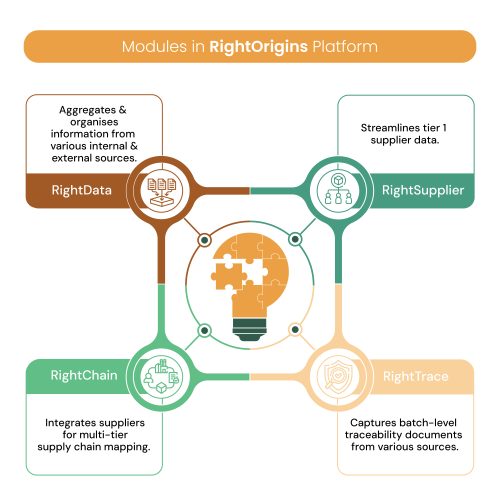Importance of Compliance in Modern Supply Chains:
In today’s globalised economy, supply chains are more complex than ever, involving multiple stakeholders, spanning various countries, and adhering to diverse regulatory frameworks. This complexity introduces significant challenges, particularly in terms of regulatory compliance and data fragmentation. Regulatory requirements are becoming increasingly stringent and multifaceted across industries. Companies must comply with various international, national, and local regulations that often change frequently. For instance, sustainability reporting standards, like the CSRD, regulations like Due Diligence, EUDR, ESG, require detailed data collection and reporting. Artificial Intelligence (AI) can significantly improve these issues, automating ESG reporting and compliance monitoring.
Data Fragmentation challenges in supply chains:
Supply chain data is often dispersed across different systems and formats, from enterprise resource planning (ERP) systems to supplier databases. This fragmentation makes obtaining a unified view of the entire supply chain challenging. Information silos can hinder data integration, making it hard to trace the origin and journey of products, ensure transparency, and verify compliance with ESG standards.
Traditional compliance methods have limitations and typically involve manual processes, spreadsheets, emails, periodic audits, and reactive measures. These approaches have several limitations such as:
- Manual Processes: Manual data collection and reporting are time-consuming, prone to errors, and lack real-time accuracy.
- Periodic Audits: The limitations of audits conducted at intervals, which fail to provide continuous monitoring and leave gaps in compliance oversight, highlight the urgency for a more comprehensive approach.
- Reactive Measures: Traditional methods often identify compliance issues after they occur rather than proactively prevent them.
How AI is Transforming ESG Reporting:
AI-powered supply chain data aggregation platforms simplify ESG reporting by consolidating fragmented data from multiple sources, such as Excel sheets, emails, and various software systems, into a unified and coherent system. Our platform, AI-powered RightOrigins utilises the power of AI to automate the aggregation of data, ensuring easy compatibility with existing ERP systems. They also facilitate the generation of automated alerts and responses to ESG-related questionnaires, significantly reducing the manual effort required. AI helps companies make data-driven decisions supporting their ESG objectives by improving data consolidation and delivering real-time insights. This improves compliance and promotes sustainable practices throughout the supply chain. The significance of these platforms lies in their ability to transform disparate data points into actionable intelligence, ensuring comprehensive and reliable ESG reporting.
Benefits of enhancing ESG Reporting with RightOrigins:
RightOrigins significantly enhances ESG reporting and stakeholder communication by automating complex reporting processes, thereby saving time and minimising human error. By digitising and organising data requests and queries, RightOrigins streamlines the communication flow between stakeholders, ensuring that information is easily accessible and comprehensible. This automation allows for more efficient handling of ESG data, freeing up valuable resources and ensuring greater accuracy in reports. Additionally, RightOrigins provides real-time visibility into ESG metrics and compliance status, offering actionable insights that facilitate proactive compliance monitoring. This ensures that companies can quickly address potential issues and maintain robust compliance with evolving regulatory requirements, ultimately fostering greater transparency and trust among stakeholders.
How AI plays a transformative role in the RightOrigins platform?

Our platform is equipped with four modules that enable data consolidation, supplier management, supply chain mapping, and traceability. With the RightData module, AI aggregates and organises information from various internal and external sources, such as sustainability reports and certification records, providing a unified data hub. It helps in auto-filling esg- related customer questionnaires based on previous responses and can help auto-detect expiry dates of various compliance documents. The RightSupplier module leverages AI to streamline tier 1 supplier data consolidation, reducing the burden on suppliers by utilising existing information and minimising redundant data requests. RightChain integrates suppliers for multi-tier supply chain mapping, ensuring comprehensive visibility and risk management. Finally, RightTrace integrates with ERPs to capture batch-level traceability documents from various sources, facilitating seamless ESG data consolidation and enhancing overall supply chain transparency and resilience. Through these capabilities, AI ensures efficient, accurate, and proactive supply chain management, driving sustainability and trust across the supply chain ecosystem.
Conclusion
The integration of AI in ESG compliance monitoring and reporting is not just a technological advancement but a necessity for modern supply chains. By addressing the challenges of regulatory compliance and data fragmentation, AI enables companies to maintain compliance, enhance transparency, and build sustainable and resilient supply chains. This will allow businesses to navigate the complexities of modern supply chains more effectively, ensuring they meet regulatory requirements and contribute positively to environmental, social, and governance goals.
